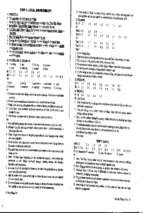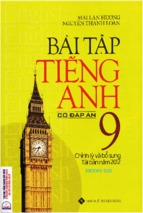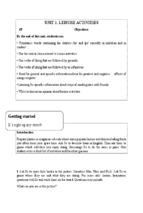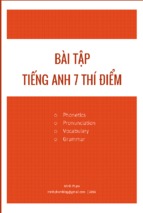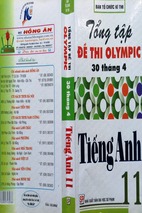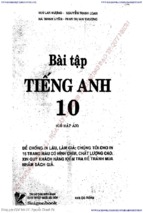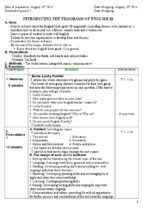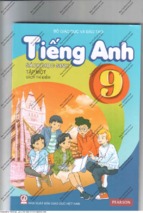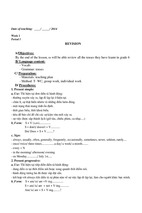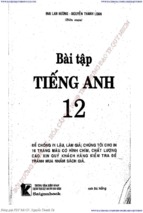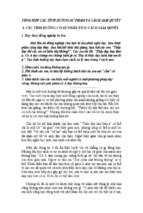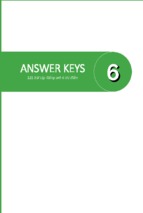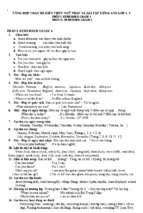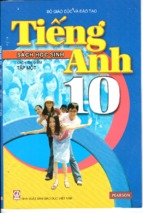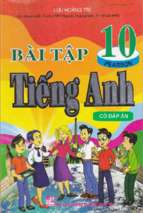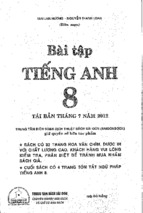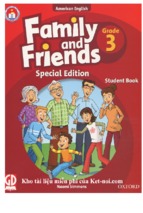BIEÂN SOAÏN : NGUYEÃN THÒ THANH TRIEÂU
RELATIVE CLAUSES OR ADJECTIVE CLAUSES
(Meänh ñeà quan heä hay meänh ñeà tính töø)
A. Relative pronouns :
FOR PERSONS
FOR THINGS
& ANIMALS
SUBJECT
OBJECT
POSSESSION
WHO
WHICH
WHO(M)
WHICH
WHOSE
OF WHICH
WHOSE
1. Defining clauses (Restrictive clauses) :
- The scientist who discovered a new planet has won the Nobel prize.
- The old castle which we visited was really interesting.
2. Non-defining clauses (Non-restrictive clauses) :
- Jack , who lives next door to my house , is very handsome.
- The TItanic , which is over 200 miles long , is known as the red planet.
B. Relative adverbs :
WHERE
:
WHEN
:
WHY
:
- I don’t know the reason
in which, in the place , at that place
on the day, at that time
for the reason
why she is absent today.
- She couldn’t remember the place where she was born.
Hoïc nhanh TIEÁNG ANH
THE USAGE OF TENSES
TENSE (Thì)
(Caùch söû duïng caùc thì)
USAGE (Caùch söû duïng)
EXAMPLES (Ví duï)
SIMPLE TENSES (Thì ñôn)
I
SIMPLE
PRESENT
1. General statement or truth
(Söï thaät hieån nhieân khaúng ñònh)
2. Present action
(Haønh ñoäng hieän taïi)
I
½
You ° ����V
¾
We °
They ¿
He ½
°
She ¾ �
It °¿
V
(always, often, usually, rarely...)
3. Habit in the present
[every(day, week, month, year)]
4. Stative verbs, verbs of perception,
emotion, possession or mental state
s
es*
SIMPLE
PAST
S� V
3. We get up at 6 every day.
(Thoùi quen hieän taïi)
(* es : s, x, sh, ch, z, o)
II
1. The sun rises in the East
and sets in the West.
2. My father works in a
bank.
ed
nd
2 column
(Ñoäng töø chæ traïng thaùi, giaùc quan,
tình caûm, sôû höõu hay tinh thaàn)
4. - His propose sounds
wonderful.
- The game begins in 10
minutes.
(know, realize, recognize, doubt,
need, feel, taste, see, sound,
smell, envy, want, possess,
belong, exist, cost,…)
1. An action happening at a definite
time in the past
1. Mary saw that film last
night.
(Haønh ñoäng xaûy ra vaøo thôøi ñieåm
xaùc ñònh trong quaù khöù)
[last night, yesterday, last (week,
month, year, …)]
2. A completed action in the past
(Haønh ñoäng hoaøn taát trong quaù khöù)
(ago)
3. Historical facts or past events
(Söï kieän lòch söû hay söï kieän trong
2. His uncle lived in Hanoi
5 years ago.
3. Ñieän Bieân Phuû battle
happened in 1954.
quaù khöù)
III
SIMPLE
FUTURE
Shall½
¾ �
Will ¿
V (- to)
- An action or state in the future.
(Haønh ñoäng hoaëc traïng thaùi ôû
töông lai)
[tomorrow, next (week, month, year)]
2
- The students will have a
test tomorrow.
Hoïc nhanh TIEÁNG ANH
CAÁ
CAÁP
P3
3
CONTINUOUS TENSES (Thì tieáp dieãn)
I
PRESENT
CONTINUOUS
am½
°
is ¾ �
are°¿
II
V � ing
1. An action happening at the present
time
(Haønh ñoäng ñang xaûy ra ôû hieän taïi)
(at the present, at the moment,
right now, now)
2. A plan or an action in the near
future
1. - The teacher is
explaining the lesson
at the present.
- It is raining now.
2. We’re having a party
tomorrow.
(Haønh ñoäng ñang xaûy ra ôû
töông lai gaàn)
PAST
CONTINUOUS
1. An action going on at a certain
point of time in the past.
(Haønh ñoäng ñang xaûy ra ôû moät
1. Tom was watching TV at
this time last night.
thôøi ñieåm nhaát ñònh trong quaù khöù)
Was ½
¾ �
Were¿
(at this time, by this time)
2. An action going on when another
action happening in the past.
V � ing
(Haønh ñoäng ñang xaûy ra khi moät
haønh ñoäng khaùc xaûy ra trong quaù khöù)
3. Two actions going on at the same
time in the past.
(Hai haønh ñoäng cuøng ñang xaûy ra
trong quaù khöù)
2. The tourist lost his
camera while he was
traveling around the city
3. While my mother was
cooking, my father was
fixing his car last night
(while)
III
FUTURE
CONTINUOUS
Will + Be + V+ ing
1. An action that will be happening at
a certain point of time in the future
(Haønh ñoäng dieãn tieán vaøo thôøi ñieåm
nhaát ñònh trong töông lai)
(at this time next (month, year,…),
by the time)
2. An action that will be happening
when another action takes place in
the future
(Moät haønh ñoäng ñang xaûy ra khi moät
haønh ñoäng khaùc xaûy ra trong töông lai)
3
1. At this time next year, my
brother will be studying
in America.
2. When you arrive, they
will be studying music
lessons.
Hoïc nhanh TIEÁNG ANH
CAÁ
CAÁP
P3
3
PERFECT TENSES ( Thì hoaøn thaønh)
PRESENT
PERFECT
I
1. An action happening at an
indefinite time in the past
1. My sister has lost her
keys.
(Haønh ñoäng xaûy ra ôû moät thôøi ñieåm
khoâng xaùc ñònh trong quùa khöù)
2. An action happening in the past
and continuing up to the present
2. The students have
studied English for five
years.
(Haønh ñoäng xaûy ra trong quaù khöù
coøn keùo daøi ñeán hieän taïi)
Has ½
¾ �
Have¿
P.P
(up to now, up to the present, so
far, for, since, lately, recently,
already, never, ever)
3. A repeated action in the past
3. They have heard that
song many times.
(Haønh ñoäng ñöôïc laäp laïi nhieàu laàn
trong quaù khöù)
(many times, several times,
repeatedly, over and over)
4. An action that has just happened.
(Haønh ñoäng vöøa môùi xaûy ra)
4. Her sister has just had
dinner.
(Just)
II
PAST
PERFECT
Had �
III
P.P
FUTURE
PERFECT
Will � Have � P.P
- An action that had happened before
another action in the past
(Haønh ñoäng ñaõ xaûy ra tröôùc moät
haønh ñoäng khaùc trong quaù khöù)
- When they arrived, we
had gone to the movies.
- An action that will have finished at
a certain point of time in the future
- By this time next year,
their brother will have
completed his English
courses.
(Haønh ñoäng seõ hoaøn taát ôû moät thôøi
ñieåm nhaát ñònh trong töông lai)
PERFECT CONTINUOUS TENSE S (Thì hoaøn thaønh tieáp dieãn)
I
PRESENT
PERFECT CONTINUOUS
Has ½
¾ � Been � V� ing
Have ¿
PAST
PERFECT CONTINUOUS
Had
FUTURE
PERFECT CONTINUOUS
Will � Have � Been � V � ing
II
III
� Been � V� ing
4
Perfect Continuous Tense
nhaán maïnh ñeán tính lieân tuïc,
khoâng giaùn ñoaïn cuûa haønh ñoäng.
Hoïc nhanh TIEÁNG ANH
CONDITIONAL SENTENCES
CONDITION
(Ñieàu kieän)
Future
Possible
IF CLAUSE
(Meänh ñeà IF)
MAIN CLAUSE
(Meänh ñeà chính)
Will ½
°
Can ¾
May °
¿
* Simple present
- If it rains
Present
Unreal
�
V(�to)
, we won’t go shopping.
Would ½
°
Could ¾ �
* Past subjunctive
(Be : Were - caû 3 ngoâi)
- If I were you
Past
Unreal
(Caâu ñieàu kieän)
°
Might ¿
V(�to)
, I wouldn’t do that.
Would ½
°
Could ¾ � Have � P.P
°
Might ¿
* Past perfect
- If it hadn’t rained yesterday , we would have gone to the beach.
Notes :
* Unless = If . . . not
- These plants will die unless you water the m regularly.
* Inversion of subject and verb (Ñaûo chuû ngöõ vaø ñoäng töø)
- If she had more practice, she would speak English better .
o Did she have more practice, she would speak English better.
- If I had seen her, I would have given her your letter .
o Had I seen her, I would have given her your letter .
CAÙC DAÏÏNG ÑOÄNG TÖØ SAU “ WISH “
Ñoäng töø ôû caâu “ coù thaät “
Ñoäng töø sau “ WISH “
Öôùc muoán
ôû töông lai
I can’t fly to Hanoi tomorrow.
He isn’t going to help me.
He won’t find it for me.
I wish I could fly to Hanoi tomorrow.
I wish he were going to help me.
I wish he would find it for me.
Öôùc muoán
ôû hieän taïi
I don’t have enough time to study
She is drinking beer right now
I can’t speak several languages
I wish I had enough time to study.
I wish she weren’t drinking beer right now.
I wish I could speak several languages..
Öôùc muoán
ôû quaù khöù
Mary didn’t understand this story
Mary couldn’t understand this story
I wish Mary had understood this story.
I wish Mary could have understood this story.
5
Hoïc nhanh TIEÁNG ANH
SUBJECT - VERB AGREEMENT (Söï hoøa hôïp giöõa chuû töø vaø ñoäng töø)
1. Chuû ngöõ soá ít o Ñoäng töø soá ít
- Her only concern is her children .
2. Chuû ngöõø coù AND noái giöõa o Ñoäng töø soá nhieàu/ soá ít, tuøy vaøo nghóa
- Mary and Susan are students .
- Love and to be loved is everything.
3. Chuû ngöõø ñöôïc noái vôùi nhau baèng WITH, TOGETHER, ALONG WITH,
AS WELL AS o Ñoäng töø theo yeáu toá ñi tröôùc
- My sister as well as her friends goes shopping every weekend .
with
along with
together with
4. Chuû ngöõ ñöôïc noái vôùi nhau baèng EITHER … OR, NEITHER … NOR, OR
o Ñoäng töø theo yeáu toá gaàn nhaát
- Either you or I am going to be punished .
5. Chuû ngöõø ñöôïc noái vôùi nhau baèng ALLBUT, BOTH … ANDo Ñoäng töø soá nhieàu
- All but Tom pass the exam .
6. Chuû ngöõø ñi sau EACH, EVERY o Ñoäng töø soá ít
- Every girl likes present .
7. Theo sau ñaïi töø baát ñònh : ANYBODY, ANYONE, EVERYBODY,
EVERYONE, NONE OF, SOMEBODY . . . o Ñoäng töø soá ít
- Is everyone hot ?
- None of us is as strong as all of us.
8. Moät caâu baét ñaàu baèng THERE hoaëc HERE o Ñoäng töø ñöôïc chia theo chuû
töø ñi sau noù
- Here comes the bus.
- There come the dishes.
9. Danh töø taäp hôïp o Ñoäng töø soá ít khi noù ñöôïc ñeà caäp nhö moät toång theå
- Your family is happy .
10. Danh töø taäp hôïp o Ñoäng töø soá nhieàu khi noù chæ soá nhieàu caùc phaàn töû
- The team are working together well .
6
Hoïc nhanh TIEÁNG ANH
CAÁ
CAÁP
P3
3
11. Caùc töïa saùch, taïp chí, phim, kòch, moùn tieàn, khoaûng thôøi gian o Ñoäng töø soá ít
- A billion dollars is a lot of money.
12. Nhöõng moân hoïc (Economics, Mathematics, Dynamics, Statistics, Physics...)
o Ñoäng töø soá ít
- Physics is my interesting subject .
13. Danh töø tröøu töôïng o Ñoäng töø soá ít
- All this information is very important .
14. Chuû ngöõ laø danh ñoäng töø, ñoäng töø nguyeân maãu vaø meänh ñeà o Ñoäng töø soá ít
- To speak English requires much practice.
MODAL VERBS
(ñoäng töø khieám khuyeát )
1. CAN, COULD
a. CAN : - Khaû naêng coù theå thöïc hieän ñieàu gì.
(Can you speak any foreign languages ?)
- Duøng ñeå yeâu caàu, xin pheùp (Can I have a drink ?)
b. COULD : - Moät khaû naêng naøo ñoù trong quaù khö.ù
(She could run 2 miles without stopping when she was young.)
- Moät söï cho pheùp trong quaù khö.ù (I could do anything I wanted.)
- Duøng ñeå yeâu caàu, xin pheùp, nhôø vaû moät caùch lòch söï.
(Could you pass salt for me, please ?)
2. MAY, MIGHT
- Chæ moät haønh ñoäng coù theå xaûy ra trong töông lai hay moät öôùc ñoaùn.
(Take an umbrella with you. It may rain later.)
- Ñeå xin pheùp, yeâu caàu, ñeà nghò coù tính caùch lòch söï. (Might I say sth ?)
3. MUST :
- Vieäc caàn thieát coù theå xaûy ra. (You must remember to go to the bank today.)
- Ñöa ra moät lôùi khuyeân. (You really must see that film. It’s wonderful).
- Khaúng ñònh moät ñieàu gì ñoù. (You must be very hungry.)
- Moät vieäc baét buoäc phaûi ñöôïc thöïc hieän. (I must get a hair cut.)
4. SHOULD :
- Moät söï baét buoäc nheï nhaøng hoaëc lôùi khuyeân. (You should study hard.)
- Duøng ôû phuû ñònh (SHOULDN’T) ñeå chæ moät lôøi khuyeân.
(The children shouldn’t sit so close the TV.)
7
Hoïc nhanh TIEÁNG ANH
PASSIVE VOICE (BE + P.P)
TENSE
Simple
present
Present
continuous
Present
perfect
Simple
past
Past
continuous
Past
perfect
ACTIVE
PASSIVE
Am / is/ are + P.P
- My mother gives me money
today.
Am / is/ are + V + ing
- The teacher is asking many
questions.
Has / Have + P.P
- They have used this
dictionary for 10 years.
Am / is/ are + Being + P.P
- Many questions are being
asked by the teacher.
Has / Have + Been + P.P
- This dictionary has been used
for 10 years.
Was / Were + P.P
- We found the book in his bag. - The book was found in his bag.
Was / Were + V + ing
- My uncle was cutting grass
when it began to rain.
- They had bought the novel
before I arrived.
½
Would °
°
°
Can
°
Could °
¾
Should °
°
May
°
Might °
°
Must
¿
Has
Have
Ought
½
°
¾
°
¿
Was / Were + Being + P.P
- Grass was being cut by my
uncle when it began to rain.
Had + Been + P.P
Had + P.P
Will
Modal Verbs
- I am given money today by
my mother.
- The novel had been bought
before I arrived.
Will
�
V(�to)
½
Would °
°
°
Can
°
Could °
¾ � Be � P.P
Should °
°
May
°
Might °
°
Must
¿
Has
� to infinitive
Have
Ought
8
½
°
¾
°
¿
� To Be � P.P
Hoïc nhanh TIEÁNG ANH
CAÁ
CAÁP
P3
3
CAUSATIVE FORM (Daïng truyeàn khieån)
sb
HAVE �
o
o
O �
sb
V(�to)
sth
P.P o passive meaning
GET �
O �
sth
To inf initive
P.P o passive meaning
The teacher has the students translate this text into English.
The teacher has this text translated into English.
I got him to repair the radio last week .
I got the radio repaired last week.
MOÄT SOÁ ÑOÄNG TÖØ THEO SAU LAØ DANH ÑOÄNG TÖØ, ÑOÄNG TÖØ
NGUYEÂN MAÃU COÙ TO HOAËC DUØNG CHUNG CHO CAÛ HAI
V � ing
°
VERB � ® To inf initive
°
¯ O � To inf initive
*
Verb + V + ing :
- admit, advise, anticipate, avoid, complete, consider, delay, deny, discuss,
dislike, enjoy, finish, forget, keep, mind, mention, miss,
postpone, practice,
protest, quit, recall, recollect, recommend, regret, resent, resist, risk, stop,
suggest, understand
- can’t stand, can’t bear, can’t help, it’s worth, it’s no use, it’s useless
- give up, put off, go on, carry on, . . .
*
Verb + To infinitive :
- afford , agree, appear, arrange, ask, attempt, beg, care, claim, consent,
decide, demand, expect, fai l, forget, hope, learn, manage, mean, offer, plan,
prepare, pretend, promise, refuse, seem, struggle, tend, thre aten, wait, . . .
*
Verb + O + To infinitive :
- advise, allow, ask, beg, cause, challenge, convince, dare, enable,
encourage, expect, force , hire, invite, mean, need, order, permit, persuade,
remind, require, teach, tell, want, warn, would like
To inf initive
:
V
�
ing
¯
* VERB � ®
- begin, start, continue, try, stop, remember, forget , need, regret
ÑAÏI HOÏC SÖ PHAÏM
TP. HCM
TRUNG TAÂM LUYEÄN THI ÑAÏI HOÏC
VÓNH VIEÃN
- ÑT : 846 9886
115 Lyù Chính Thaéng - Quaän 3
- ÑT : 810 5851
481 Tröôøng Chinh - P.14 - Q.TB
(Ñoái dieän Trung taâm daïy ngheà Taân Bình, vaøo 30m)
- ÑT : 830 3795
33 Vónh Vieãn - Q.10 (Tröôøng CÑ Kinh Teá)
9
Hoïc nhanh TIEÁNG ANH
FORMATION OF NOUNS
(Caùch thaønh laäp danh töø)
* Theâm tieáp ñaàu ngöõ (Prefix) vaøo tröôùc töø
Prefix
disin– imunmiscocom- conbi reafter-
outoverunder-
Meaning
hai
laïi, laàn nöõa
sau
phaùt ra, ôû ngoaøi
Example
* displeasure, dishonesty
* injustice, impurity
* untruth, unbelief
* misbehavior, misconception
* co-education, co-author
* compassion, confederation
* bicycle, bilingual
* rearmament, redevelopment
* afternoon, afterthought
* outbreak, outlaw
treân
* overtime, overproduction
döôùi, keùm
* undergrowth, undertone
traùi nghóa
sai, loãi laàm
cuøng vôùi
* Theâm tieáp vó ngöõ (suffix) vaøo sau töø
Suffix
-ar
-or
-er
-dom
(sau danh hoaëc tính töø)
-full
-hood
(sau danh hoaëc tính töø)
-ie
-let
-ling
-ing
-ness
(sau tính töø)
-ship
-th (sau tính töø)
-ty
-ity
Meaning
Example
ngöôøi laøm
* beggar, liar
* actor, conductor
* leader, writer
(tình traïng, lónh vöïc)
* freedom, wisdom, kingdom
ñaày
* handful, mouthful
(danh töø tröøu töôïng)
* childhood,neighborhood, brotherhood
coâng vieäc
* birdie
* booklet
* duckling
* walking, reading, writing, dancing
(danh töø tröøu töôïng)
* kindness, usefulness, happiness
(danh töø tröøu töôïng)
(danh töø tröøu töôïng)
* friendship, fellowship
* truth, warmth, width, growth
* cruelty, loyalty
* electricity,
, profundity
vaät nhoû beù
(danh töø tröøu töôïng)
10
Hoïc nhanh TIEÁNG ANH
CAÁ
CAÁP
P3
3
FORMATION OF COMPOUND NOUNS (Caùch thaønh laäp danh töø keùp)
noun
gerund
+ noun
+ noun
schoolboy, classroom
dining-car, sitting-room
adjective
noun
+ noun
+ preposition
blackboard, grandfather
looker-on, passer-by
verb
+ noun
pick-pocket, cut-pocket
FORMATION OF ADJECTIVES (Caùch thaønh laäp tính töø)
* Theâm tieáp ñaàu ngöõ (Prefix) vaøo tröôùc töø
a
Prefix
+ Verb
un, in, im + Adj.
Meaning
ñang
Example
alive, asleep
khoâng
unhappy, unlucky, inactive, impolite
* Theâm tieáp vó ngöõ (suffix) vaøo sau töø
Suffix
Verb
+ ed
Noun
+ en
ñöôïc, bò
laøm baèng chaát lieäu
Example
equipped, pleased
golden, wooden
Noun
Noun
(sau ñoäng töø chæ phöông höôùng)
ñaày ñuû, nhieàu
southern, northern
hopeful, beautiful
Noun
+ ish
Adjective + ish
hôi, coù veû
babyish, reddish,
youngish
Noun
Noun
khoâng
coù veû gioáng nhö
hopeless, homeless
fairylike, dreamlike
+ ern
+ ful
+ less
+ like
Noun
+ ly
Noun
+ some
Adjective + some
Noun
+y
Meaning
lovely, daily, monthly
quarrelsome
(chæ tính caùch)
gladsome
(thuôøng ñi vôùi danh töø chæ thôøi tieá
) t rainy, sunny, snowy
coù veû gioáng nhö
FORMATION OF COMPOUND ADJECTIVES (Caùch thaønh laäp tính töø keùp)
adj
+ adj
dark-blue, red-hot
noun
adj
+ adj
+ noun + ed
snow-white, blood-red
dark-eyed, bare-footed
11
Hoïc nhanh TIEÁNG ANH
CAÁ
CAÁP
P3
3
VERBS FORMED FROM ADJECTIVES AND NOUNS
(Caùc ñoäng töø ñöôïc thaønh laäp töø tính töø vaø danh töø)
ADJECTIVE
VERB
able
angry
black
bright
broad
calm
certain
cheap
civil
clean
clear
dark
deep
electric
equal
false
fat
fertile
full
glad
hot
large
less
light
long
loose
low
mad
obedient
pure
quick
rich
sad
safe
sharp
enable
anger
blacken
brighten
broaden
becalm
ascertain
cheapen
civilize
cleanse
clarify
darken
deepen
electrify
equalize
falsify
fatten
fertilize
fill
gladden
heat
enlarge
lessen
lighten
lengthen
loosen
lower
madden
obey
purify
quicken
enrich
sadden
save
sharpen
MEANING
cho pheùp, taïo khaû naêng
laøm töùc giaän
boâi ñen
laøm raïng rôõ, laøm saùng
môû roäng
laøm laëng
xaùc ñònh
laøm cho reû hôn
laøm cho vaên minh
thanh loïc, taåy saïch
laøm roõ
laøm saãm laïi
laøm cho saâu
truyeàn ñieän
san baèng (tæ soá)
laøm giaû
laøm cho beùo
laøm cho maøu môõ
laáp ñaày
laøm cho vui söôùng
laøm noùng
phoùng to
laøm giaûm
laøm saùng
keùo daøi
nôùi loûng, thuøng thình
haï thaáp
laøm (ai) phaùt ñieân
vaâng lôøi
laøm trong saïch
laøm taêng tröôûng
laøm giaøu
laøm buoàn
ñeå daønh
laøm beùn, saéc
NOUNS
actor
addition
beauty
belief
blood
circle
circulation
class
colony
VERB
act
add
beautify
believe
bleed
encircle
circulate
classify
colonize
MEANING
h aønh ñoäng
c oäng, theâm vaøo
laøm ñeïp
tin töôûng
chaûy maùu
bao vaây
löu thoâng
phaân loaïi
thöïc daân hoùa
company
accompany hôïp vôùi, ñi cuøng
competition compete tranh ñua, caïnh tranh
composition compose saùng taùc
courage
creator
custom
deed
description
dictation
dirt
division
drama
education
endurance
food
friend
glory
grief
growth
horror
illustration
imitation
justice
knee
knowledge
life
12
encourage
create
accustom
do
describe
dictate
dirty
divide
dramatize
educate
endure
feed
befriend
glorify
grieve
grow
horrify
illustrate
imitate
justify
kneel
know
live
khuyeán khích
taïo ra, saùng taïo
laøm cho quen
laøm
moâ taû
aùm taû, ñoïc ñeå ghi cheùp
laøm baån
chia
ñoùng kòch
giaùo duïc
chòu ñöïng
cho aên
giuùp ñôõ
laøm veû vang
ñau buoàn
taêng tröôûng, phaùt trieån
laøm kinh hoaøng
minh hoïa
baét chöôùc
phaåm ñònh, minh chöùng
quyø goái
bieát
soáng
Hoïc nhanh TIEÁNG ANH
ADJECTIVE
short
simple
smooth
soft
solemn
solid
strong
sweet
tight
vacant
visual
wide
VERB
shorten
simplify
smoothen
soften
solemnize
solidify
strengthen
sweeten
tighten
vacate
visualize
widen
MEANING
NOUNS
ruùt ngaén
ñôn giaûn hoaù
laøm phaúng
laøm dòu
trònh troïng hoaù
cuûng coá
taêng cöôøng
laøm ngoït
thaét chaët
laøm troáng
hình dung
môû roäng
VERB
CAÁ
CAÁP
P3
3
MEANING
liquid
moisture
nation
pleasure
product
proof
relief
solution
success
liquefy
moisturize
nationalize
please
produce
prove
relieve
solve
succeed
laøm loûng
laøm aåm
quoác höõu hoùa
laøm haøi loøng
saûn xuaát
chöùng minh
laøm nheï
giaûi quyeát
thaønh coâng
sympathy
sympathize
caûm thoâng
terror
thought
terrify
think
laøm khieáp sôï
suy nghó
PREPOSITIONS
PREPOSITION OF TIME
NOUN + PREPOSITION
BY accident = BY chance
BY cheque
BY mistake
FOR example = FOR instance
FOR fun
FOR breakfast/lunch/dinner
FOR the sake OF
FOR sale
FOR a walk/a swim/a drink
IN one’s opinion
IN love with
ON a diet
ON fire
ON holiday/business/a trip
ON strike
ON TV/the radio
OUT OF date z UP TO date
OUT OF order
OUT OF practice
OUT OF sight
OUT OF work
AT
tình côø
- noon, night, midnight,…
baèng ngaân phieáu
- 5 o’clock, ten forty,
do sô xuaát
half past four,…
- the age of,…
thí duï?
ON
cho vui
cho böõa ñieåm taâm/tröa/toái - Monday, Tuesday,…
vì lôïi ích
ñeå baùn
ñi taûn boä/bôi/uoáng
theo yù kieán (ai)
yeâu ai
aên kieâng
ñang c haùy
ñi nghæ maùt/coâng
taùc/du lòch
ñình coâng
treân TV/radio
loãi thôøi
hö hoûng
khoâng luyeän taäp
xa taàm nhìn
thaáp nghieäp
- June 21st, 2005,…
- Christmas day, holiday,
- Sunday morning,
Friday evening,…
- weekdays, weekend,…
IN
-
February, March, May,…
2005, 1999,…
Spring, Summer, Fall, Winter
the morning, the afternoon,
the evening
PREPOSITION OF PLACE
AT
- 2 Le Duan Street,
District 1,…
- school, home, play,
work,…
IN
- Vietnam, the U.S, Japan,
Singapore, England,…
- HCM City, Paris,
London, New York,…
- a box, a room,
the factory,...
IN or AT
- a river
- the sea
- the swimming pool
PREPOSITION
OF MOVEMENT
FROM . . . TO / TILL
: Töø . . . ñeán
SINCE
: Töø khi
FOR
: Trong
(khoaûng thôøi gian) BY
DURING : Trong suoát
13
ON
- foot, horseback,…
(thôøi gian)
- bus, train, car, ship,
motorbike,…
Hoïc nhanh TIEÁNG ANH
CAÁ
CAÁP
P3
3
ADJECTIVE + PREPOSITION
afraid OF
sôï, ngaïi
full OF sb / sth
ngaïc nhieân veà
good AT sth
amazed AT
angry WITH sb (ABOUT/AT) sth giaän döõ ai veà ñieàu gì grateful TO sb FOR sth
giaän ai veà ñieàu gì happy ABOUT / IN / WITH
angry WITH sb FOR
doing sth
annoyed WITHsb (ABOUT/AT)sth böïc mình ai veà ñieàu gì hopeles s AT sth
lo laéng veà
hungry FOR
anxious ABOUT
tha thieát mong öôùc jealous OF
anxious FOR
noåi giaän veà
kind T O
furious ABOUT
xaáu hoå
keen ON
ashamed OF
kinh ngaïc veà
mad ABOUT / ON
astonished AT/ BY sth
bieát, nhaän bieát
aware OF = c onscious OF
married TO
dôû veà caùi gì
bad AT z good AT
mean TO
chaùn
nice TO
bored WITH / AT sth
baän roän
nervous ABOUT
busy WITH / AT sth
coù khaû naêng veà
proud OF
capable OF
gioûi veà
rude TO
clever AT
caån thaän veà
satisfied WITH
careful ABOUT/ OF
ñieàu gì
z careless ABOUT
= pleased WITH
caån thaän ñoái vôùi
scare OF
careful WITH
chaén chaén veà
short OF
certain OF/ ABOUT
sorry FOR / ABOUT
considerate OF/ TOWARDS sb quan taâm ñeán ai
taøn nhaãn vôùi ai/caùi gì surprised AT
cruel TO sb / sth
haøi loøng
shocked AT / BY
delighted WITH / AT sth
vôùi / veà ñieàu gì
khaùc nhau
similar TO
different FROM
disappointed WITH/ IN sb/ sth thaát voïng veà
tired OF = bored WITH
eager FOR
engaged TO sb
equal TO
excited ABOUT sth
familiar WITH sth / sb
famous FOR sth
fond OF sb / sth
khao khaùt
höùa hoân vôùi ai
töông ñöông
phaán khôûi veà
quen thuoäc vôùi
noåi tieáng veà
yeâu thích
ai / ñieàu gì
tired FROM
typical OF
upset ABOUT
worth y OF
worried ABOUT
interested IN
nice/kind/good/
friendly/polite OF
14
ñaày
gioûi veà
bieát ôn ai veà ñieàu gì
haïnh phuùc,
sung söôùng veà
voâ voïng veà
khao khaùt
ghen tò
töû teá
say meâ, soát saéng
raát say ñaém
keát hoân vôùi
buûn xæn, heøn haï
töû teá, thaân thieän
lo sôï, hoài hoäp veà
kieân haõnh veà
hoån laùo
haøi loøng, thoûa maõn
sôï
thieáu
aân haän, hoái tieác
ngaïc nhieân veà
bò chaán ñoäng veà,
söûng soát veà
töông töï
chaùn
meät moûi veà
tieâu bieåu, ñieån hình
khoù chòu veà
xöùng ñaùng
lo laéng veà
thích, quan taâm
toát, töû teá, thaân
thieän, lòch söï
Hoïc nhanh TIEÁNG ANH
CAÁ
CAÁP
P3
3
VERB + PREPOSITION
accord WITH
accompany BY sb
accompany WITH sth
adjust TO
admire sth/sb FOR sth
hôïp vôùi
ñi keøm vôùi
hoøa nhòp
thích nghi
khaâm phuïc
dream OF
engage TO
fight FOR
gaze AT
get IN z get OFF
agree WITH sb
ABOUT/ ON sth
angry WITH sb ABOUT/AT sth
aim AT
apologize TO sb FOR sth
arrive AT (small place)
arrive IN (large place)
appeal TO
apply FOR
approve OF
argue WITH sb ABOUT/OVER sth
ñoàng yù vôùi ai
veà ñieàu gì
giaän ai veà ñieàu gì
ghaém vaøo
get On z get OFF
mô trôû thaønh
ñính hoân
chieán ñaáu cho
nhìn chaè m chaèm
leân
(Car, Taxi, Small boat)
believe IN
belong TO
blush FOR
boast OF
care ABOUT
care FOR
combine WITH
comment ON
compare WITH
complain TO sb ABOUT sth
consist OF
count ON
ceal WITH
cebate ABOUT
depend ON
difficulty WITH sth
difficulty IN doing sth
derive FROM
die FOR
die OF
differ FROM
do WITH
(Bus, Train, Plane, Ship)
grateful TO
glance AT
xin loãi ai veà ñieàu gì Insist ON
ñeán
live ON
ñeán
listen TO
haáp daãn, thu huùt
look AFTER
noäp ñôn
look FOR
taùn thaønh
look FORWARD TO
tranh caûi vôùi ai veà ñieàu gì object TO
tin töôûng vaøo
participate IN
thuoäc veà
propose TO
theïn ñoû maët
put OUT
khoe khoang
put OFF
quan taâm, lo laéng refer TO
thích, muoán
r esponsible TO sb FOR sth
keáp hôïp vôùi
quarrel WITH
bình luaän veà
seek FOR = Search
stand FOR
so saùnh
phaøn naøn ai veà ñieàu gì su ffer FROM
sympathize WITH
goàm coù
tin töôûng vaøo
think ABOUT
think OVER
giao dòch
wait FOR
tranh luaän veà
wander FROM
phuï thuoäc vaøo
watch OVER
khoù khaên
wave AT
khoù khaên
weep FOR
coù nguoàn goác töø
whisper TO
cheát (vì lí töôûng)
wish FOR
cheát (vì beänh)
wonder ABOUT
chòu ñöïng
wonder AT
khaùc bieät vôùi
15
leân
bieát ôn
lieác nhìn
khaêng khaêng
soáng nhôø vaøo
laéng nghe
chaêm soùc
tìm kieám
mong ñôïi
phaûn ñoái
tham gia
caàu hoân
daäp taét
dôøi laïi
ñeà caäp
chòu traùch nhieäm
caûi vaû
tìm kieám
thay cho
chòu döïng
thoâng caûm
nghó veà, nhôù veà
caân nhaéc veà
chôø ñôïi
laïc ñöôøng
troâng noâm
vaåy tay
khoùc vì
thì thaàm
mong öôùc
thaéc maéc veà
ngaïc nhieân veà
Hoïc nhanh TIEÁNG ANH
REPORTED SPEECH
(Caâu töôøng thuaät)
Khi chuyeån töø caâu daãn tröïc tieáp sang caâu töôøng thuaät, caàn löu yù :
1. Chuû ngöõ :
- Ngoâi thöù nhaát trong meänh ñeà phuï (trong ngoaëc keùp) o cuøng ngoâi vôùi
chuû ng öõø meänh ñeà chính.
- Ngoâi th öù hai trong meänh ñeà phuï o cuøng ngoâi vôùi tuùc tö ø meänh ñeà chính.
- Ngoâi thöù ba khoâng thay ñoåi.
2. Ñoäng töø :
- Neáu ñoäng töø ôû meänh ñeà chính ôû thì hieän taïi hay hieän taïi töông ñöông o
ñoäng töø trong meänh ñeà phuï khoâng thay ñoåi thì.
- Neáu ñoäng töø ôû meänh ñeà phuï ôû thì quaù khöù o taát caû ñoäng töø trong meänh ñeà
phuï seõ ñoåi theo baûng (1).
3. Traïng töø chæ thôøi gian : Thay ñoåi theo baûng (2).
BAÛNG (1)
BAÛNG (2)
DIRECT
INDIRECT
DIRECT
Simple present o
Simple past
o
Present perfect o
Past perfect
o
Present continuous o
Past continuous o
Future
o
Simple past
Past perfect
Past perfect
Past perfect
Past continuous
Past prefect continuous
Future in past
[Would + V (-to)]
Now
This, these
Here
Ago
Today, tonight
Last night
Yesterday
Tomorrow
TYPE
Statements
DIRECT
- He said, “I will come here soon”
- Mary says, “I am beautiful”
INDIRECT
o
o
o
o
o
o
o
o
Then
That, those
There
Before
That day, that night
The night before
The day before
The next day
INDIRECT SPEECH
- He told me (that) he would come
there soon.
- Mary says (that) she is beautiful.
- Tom asked Mary if (whether) she
understood him.
- She asked me if (whether) he
would leave.
Yes, No
questions
- Tom asked Mary, “ Do you
understand me ? “
- She asked, “ Will he leave ? “
W-H questions
- Susan asked, “ What time is it ? “ - She asked me what time it was.
- They asked me when the meeting
- They asked, “ When will the
would end.
meeting end ? “
Commands
or
Requests
- The teacher said, “Sit down, please“ The teacher told us to sit down.
- She said, “ Don’t put your book on - She told me not to put my book
my table “
on her table.
16
- Xem thêm -

